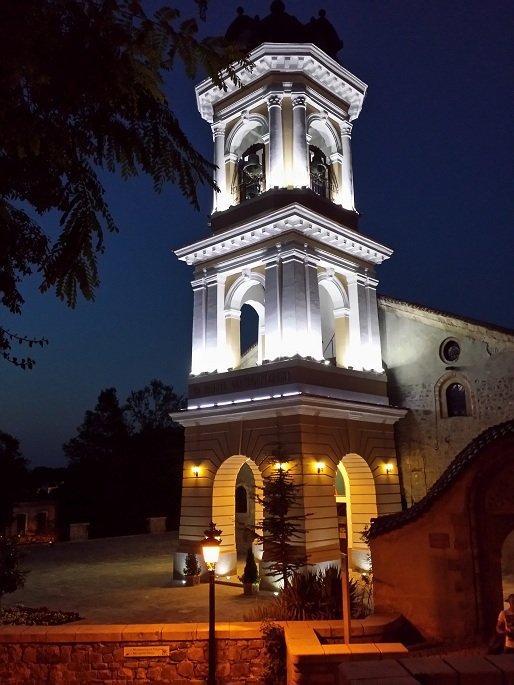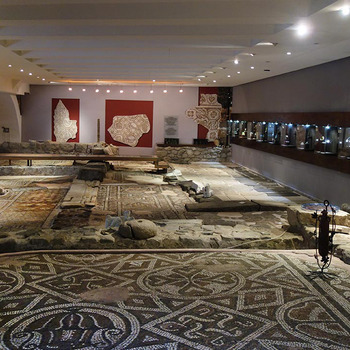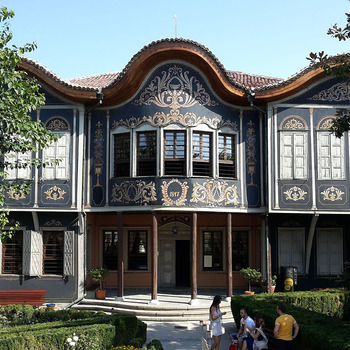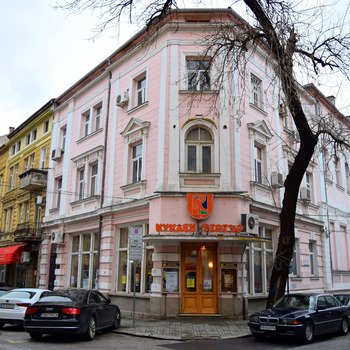Church of the Assumption in Plovdiv
Overview
The Church of the Assumption or the Holy Mother of God is an Orthodox church in the Old Town of Plovdiv, a cathedral of the Plovdiv Diocese of the Bulgarian Orthodox Church. The temple holiday is August 15, Assumption of the Blessed Virgin.
At the place where the cathedral church "Assumption" is located today, it seems that in the IX-X century there was a Christian sanctuary. During the renovation of the church in 1844, a tombstone with an undated Greek inscription was found under the Holy Altar, which the famous Byzantine Epiphanius Aliatus named as the "founder of this temple of God".
Nikita Honiat mentions the Church of the Holy Mother of God in Philippopolis: it was rebuilt in 1189 under Metropolitan Constantine Pantechni, it was looted by the Crusaders of the Third Crusade. The building was later rebuilt. The traveler Anton Vrančić (1504 - 1573) heard the following legend: "When Plovdiv passed under the rule of the Turks, without the intervention of a storm or earthquake, a crack appeared on the very top [on one of the hills of the Three Hills] and engulfed the monastery. now there is a crack and the tops of sunken walls can be seen. The monastery itself was dedicated to the Blessed Virgin Mary. The monks living inside escaped death. "
The church continued to exist: Stephen Gerlach, who visited Philippopolis in 1578, mentions it (second only to the Metropolitan Church of St. Marina) under the name of the Most Holy (Allerheiligste). ., under Metropolitan Neophyte, with funds from the rhetorician Andronicus Until 1825, the teachers at the Plovdiv Main Greek School supported themselves from the income of the church.
By 1844 the old church was demolished and Bratsigovo masters built a new, larger, entirely stone church in its place. This is evidenced by a marble plaque with a Bulgarian inscription, erected above the northern church door: “started to build. on 25 ap. 1844 “. The first donors are the fugitives from Koprivshtitsa Valko and Stoyan Teodorovich Chalakovi. The construction was completed probably eight years later: "And since at that time the richest were in that neighborhood, they could, if the deposit was not enough, collect support, as it happened, to finish the building and so it ended and became wonderful. the church of 182 was written by Konstantin Moravenov.
The Church of the Holy Mother of God is historically connected with the church-national struggle. "In the seven city churches at that time [1857] only Greek was served," says Joakim Gruev. Petka ", where before his arrival he also served in Slavonic. After the removal of Phanariotin the Bulgarian activists, encouraged by their first success in the fight against him, expressed a desire to introduce worship in one of the city churches in Slavonic. Bishop Paisii, if to be aware of the justice of this desire, he could not satisfy the Bulgarians without the consent of the patriarchate, and the patriarchate did not listen to the repeated statements of the bishop and the Bulgarians. Greeks, raged and impatient the more agile young people, and the school "St. Cyril and Methodius" gave an occasion to act decisively. A student from my boarding house, named Nesho p. Braikov, was set to read in the church "St. The Virgin "by the apostle in Slavonic; for the first time on November 14 he failed, and on November 30 [1859], preserved by his comrades after an argument with the Greeks, he succeeded in reading the ancient apostle in Slavonic." Finally, on December 25, 1859, the Nativity of Christ, Metropolitan Paisius and the church priest priest Zlatan celebrated a festive Holy Liturgy in the church not in Greek, but entirely in Church Slavonic.
According to the Sultan's decree for the establishment of the Exarchate (1870), "the Holy Mother of God neighborhood, which is in the city of Philippopolis itself, will enter the Bulgarian Exarchate." Thus, in Plovdiv until 1906 there were two dioceses: a Greek one at the old metropolitan church "St. Marina" and a Bulgarian one at the church "St. Bogoroditsa". In the latter, the Plovdiv Exarchate Metropolitan Panaret (1872) was welcomed and a prayer of thanksgiving was offered for the liberation of the city during the Russo-Turkish War (January 5, 1878).
Recommended
- Clianti House
- Ancient theater
- Exposition "Encho Pironkov"
- Hindlian House
- Church of the Holy Martyr Marina
- Episcopal Basilica of Philippopolis


 Bulgarian
Bulgarian Romanian
Romanian



